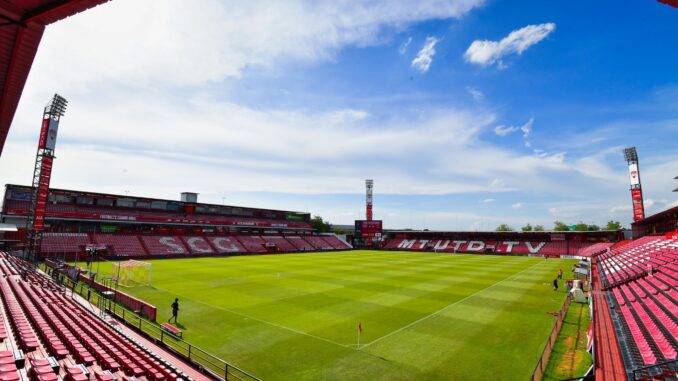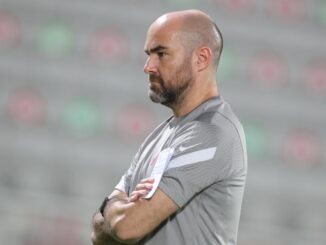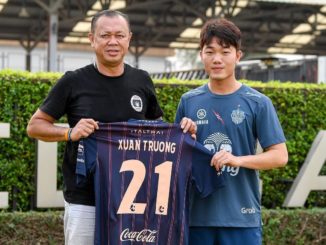
Clubs across the world are grappling with player pay cuts to cope with the financial difficulties enforced by COVID-19.
However, for Thai League giants Muangthong United, the crisis has added to deep financial problems already plaguing the club, and has pushed their firesale of top players into high gear
Muangthong United have been in the headlines for all the wrong reasons over the past few seasons, and the situation is set to get worse as more top players prepare to depart the club.
Despite being the second-most successful team in the country, and one of the most internationally renowned, the side were forced to lift themselves from what could have turned into a relegation battle in 2019, only to see many of their top players depart before the start of the current campaign.
Alarm bells have been ringing for a long time at the SCG Stadium, but it seems as though nobody had been bothered to heed them. The Kirin now find themselves with a virtually unrecognisable lineup, with every single member of their last title winning side now gone with the most recent departures of Adisorn Promrak and Sarach Yooyen, who this week joined local rivals Port and BG Pathum United respectively.
These moves have left Muangthong with a squad composed almost entirely of academy graduates and U23 players, with no established Thai internationals left on the books – something almost unthinkable for a side which hosted a majority of War Elephants regulars just a few seasons ago.
How did one of the country’s most powerful clubs reach this position?
Like most things in Thai football, the facts are unclear, the logic is nonsensical, and the underlying causes will likely remain an enigma. But it is important to understand the most recent peak in the club’s history to fully grasp the trough that they are currently in.
After three years of falling short to the unstoppable Buriram United machine, Muangthong returned to the summit of Thai football in 2016. The Kirin signed key players from Thailand’s ‘golden generation’ before the start of the campaign, most notably Chanathip Songkrasin and Tanaboon Kesarat, and tasked former Thai national team star, and rapidly rising coach, Totchtawan Sripan with leading the young crop to greatness.
Muangthong stomped the rest of the competition en route to a remarkable league triumph, which would have seen them set a points record had the season not ended prematurely. They took their exploits to the continent in 2017, getting the better of Brisbane Roar, Kashima Antlers and Ulsan Hyundai at home to force their way into the AFC Champions League knockout stages.
However, the Kirin’s success began to unravel in 2018, with foreign recruits struggling to stay fit while Thai stars Chanathip, Teerasil Dangda and Theerathon Bunmathan took their talents to the elevated stage of the J.League.
Coach Totchtawan resigned five games into the campaign following an appalling and scarcely believable 6-1 defeat to newly promoted Prachuap FC, setting off a period of instability and stagnation from which the club is still yet to emerge.
Five different coaches would take the helm over the following two seasons, with the Kirin finishing fourth and fifth respectively, with awful spells which once even saw them fall into the relegation zone.
The team’s style of play bounced around erratically, as the squad was stretched in the void of any identity. As clubs such as Bangkok United, Chiang Rai United and local rivals Port soon began to overtake them in financial might, Muangthong soon realised that they were losing their grip on their lofty position.
It is understandable, given this realisation, that a move towards youth development and future planning could be one route to remain relevant amid the tides of change.
However, to call this movement towards youth a ‘strategy’ bestows a level of intention and foresight that is probably not merited given the way events have unfolded.
For one, the speed at which the club’s experienced players have been replaced has been astounding, as has the fact that many of them have been sold to direct rivals.
Secondly, given the fact that the rumblings of financial trouble preceded this pivot, it seems as though the turn towards youth was a reaction to immediate circumstances as opposed to a calculated change in emphasis. This ‘strategy,’ and more importantly the speed at which it has been ‘implemented,’ would be unrealistic if carried out in FIFA or Football Manager, let alone in real life.
While the source of finances in the Thai League is often murky, a few possible causes of the club’s current predicament come to mind.
Firstly, unlike the other top Thai clubs, whose affluent owners use sponsorship deals to funnel their own money into the club, Muangthong’s big-wigs don’t dip into their personal wealth to fund the club, and rely entirely on sponsorship deals and more ‘traditional’ forms of revenue.
Any potential falling-out with the club’s benefactors which hamstrung the management before the start of 2020 has surely been exacerbated due to the current COVID-19 situation, where football is not set to restart until September.
As is always the case in Thai football, the impetus for these shocking moves remains unclear. Some suggest that Sarach and Adisorn were agitating for a move, unhappy with the pay cut or more broadly the fact that many of their former teammates have also departed the club.
On the other hand, others maintain that the management is pushing them out, forcing these departures against their will due to the financial strain.
Ultimately, what is clear is that Muangthong is not in a good place and will require an immense effort to achieve anything resembling success given their current circumstances.
Their achievements this season – and possibly over the next few seasons – will depend entirely on this young crop’s ability to come of age at unprecedented speed, and on the club and coaching staff to provide a stable ground for them to do so.
It may be a long shot, but it seems like this is the only way for Muangthong to retain their already precarious place among Thailand’s footballing elite.
Photo: Thai League
Listen to Thai League deputy CEO discuss how they are dealing with the COVID-19 pandemic





1 Trackback / Pingback
Comments are closed.